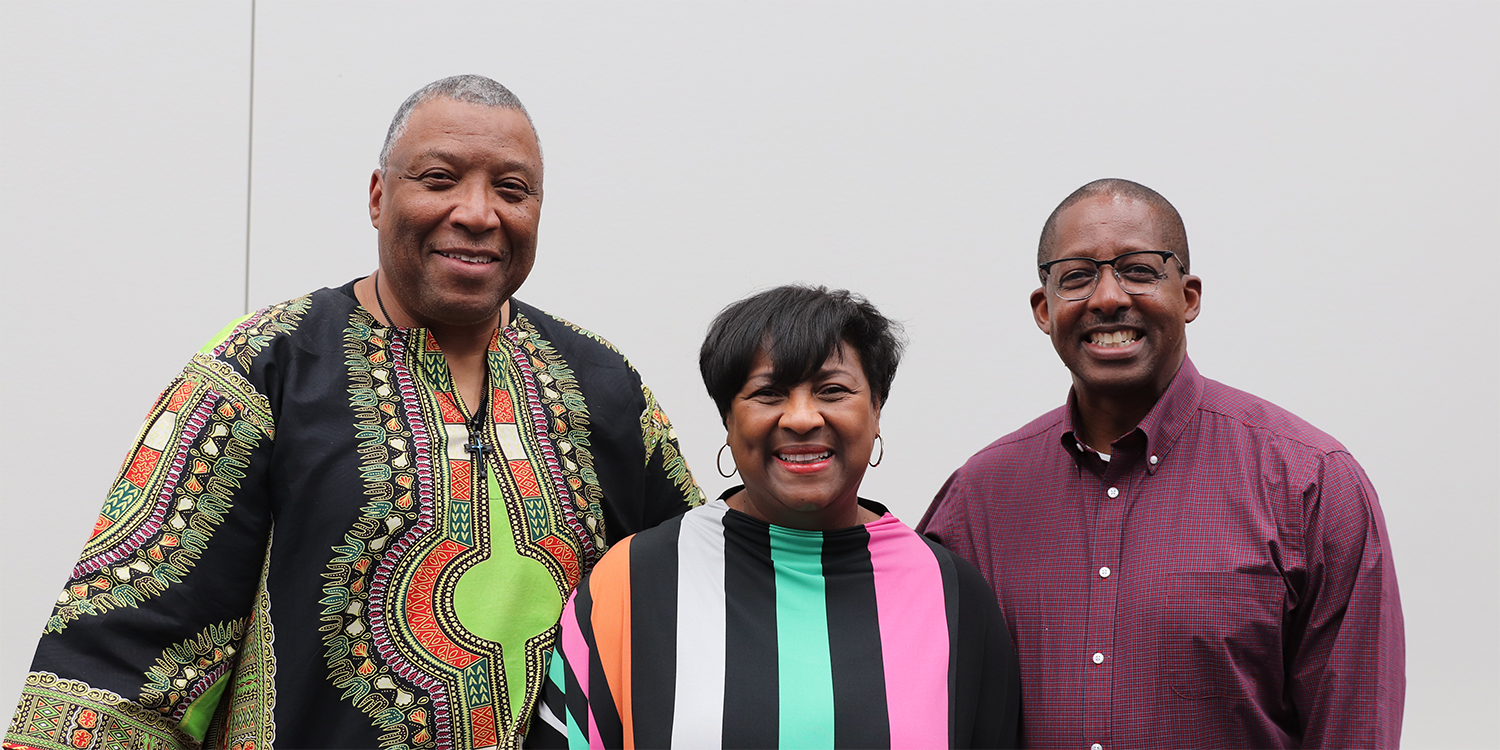
From left, pictured are the Rev. Dr. Danny Murphy, the Rev. Dr. SanDawna Gaulman Ashley, and the Rev. Byron Wade, members of the African American Mid Council Leaders. Photo by Kristen Gaydos
After meeting in a retreat for two days ahead of the 226th General Assembly, members of the African American Mid Council Leaders spoke with Presbyterian News Service about some of the challenges both African American congregations and pastor face moving forward.
The three leaders who took time Sunday to speak with PNS are:
- The Rev. Dr. Danny Murphy, general presbyter of Trinity Presbytery
- The Rev. Dr. SanDawna Gaulman Ashley, transitional synod leader with the Synod of the Northeast
- The Rev. Byron Wade, general presbyter of the Presbytery of Western North Carolina and the vice-moderator of the 218th General Assembly (2008).
Of the 12 leaders gathered June 27-28, some of the PC(USA)’s largest mid councils, including Synod of the Northeast, Synod of the Mid-Atlantic, the Presbytery of Coastal Carolina, the Presbytery of Greater Atlanta, the Presbytery of New Hope, the Presbytery of Baltimore and the Presbytery of New York City, were represented.
“The group has been going forever and a day,” said Murphy, himself a member for 36 years.
“It was important to have the opportunity to gather at this time,” said Gaulman Ashley. “Supporting small churches is something we are all concerned about, and we realize this is the time we have to be strategic and intentional about how we are resourcing.”
Fully four in five predominantly African American churches in the PC(USA) are without installed leadership, the leaders noted.
Fellowship divine
Wade said it was the first time he’d attended an AAMCL meeting.
“I learned the importance of fellowship,” he said. African American mid council leaders “don’t often have a chance to see one another. It was an encouraging fellowship time.”
The mid council leaders heard a presentation by the Rev. Warren J. Lesane, Jr., Stated Clerk for the Synod of the Mid-Atlantic, who’s working on the Next Generation Initiative to help fill pastoral vacancies in that synod. Lesane’s goal is to cultivate a vibrant community of Black Presbyterian congregations through visionary leadership and strategic planning. Wade said the hope is the initiative will serve as a pilot for churches across the country.
The Rev. Dr. Jerry L. Cannon, Vice President for Ministry Innovation at the Board of Pensions, led those gathered on the Board’s support for congregations of color, emphasizing the importance of minimum salary, pension and medical benefits.
Murphy said AAMCL’s purpose is threefold:
- To provide a collaborative platform for African American leaders to address the unique challenges and opportunities within majority white ministry contexts.
- To advocate for the needs of African American congregations and pastors.
- To promote leadership development, equity and inclusion with the PC(USA).
Leaders plan to explore how to partner with the Jesse C. Swanigan Scholars Program, a one-year educational fellowship program designed to nurture and support people of color by obtaining mid council executive leadership education in the PC(USA). The Synod of Mid-America is covering the costs associated with the program.
The mid council leaders have chosen Sheena Iyengar’s book “Think Bigger” to discuss. The book explores how individuals and organizations can foster innovation by challenging conventional thinking, embracing diverse perspectives and utilizing strategies to enhance creativity and problem-solving skills.
“We have learned to stay at the table to be a part of the important conversations,” Gaulman Ashley said. “We recognize this is a calling to this particular role [of mid council leadership]. It’s important to understand the work and be a part of the change we want to see, even if the table is not ready for you.”
Ministry administration is hard, “and it’s hard across the board,” she said. Synods have “responsibilities for resourcing presbyteries and pastors, but you’re not doing the work. You’re a resource, and it takes a while to get things done. There’s a great sense of urgency to find solutions.”
African American pastors “have never been able to serve just their congregations,” she said. Many are also public theologians who are engaged as community leaders as well. And that’s not limited to urban settings, she said, adding, “rural churches have that need.”
“What the larger church can learn from African American churches is we have always had to do more with less,” Wade said.
That reminded Murphy of Luke’s account of the shipwreck Paul and his companions survived in Acts 27:39-44.
“They made it to shore on planks of wood,” Murphy said. “African American churches have had to figure out how to make it to shore on broken pieces of wood.”
